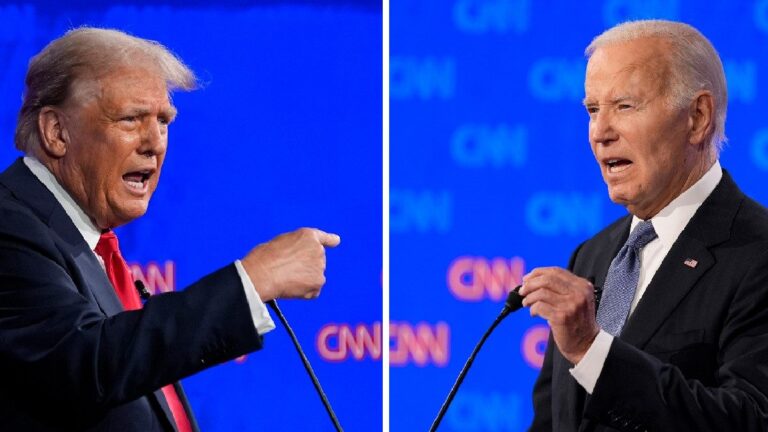On November 5, 2024, the United States will hold its 60th presidential election. This crucial election will see a showdown between two prominent figures: Joe Biden, representing the Democratic Party, and Donald Trump, representing the Republican Party. Interestingly, Biden is 81 years old and Trump is 78 years old. Aside from the typical campaign rhetoric of both camps, the two candidates also face personal challenges.
Democrats seem to be more concerned about the age of their candidate, Joe Biden, than Republicans. Biden’s recent performance in a nationally televised 90-minute presidential debate drew mixed reviews. Some observers pointed to a moment when Biden struggled to complete a sentence and mistakenly said, “I won Medicare,” the U.S. government health care system for the elderly. Biden may have meant to say, “I won COVID.” This is not the first time Biden’s mental acuity has been publicly questioned. Last month, at the G7 summit in Italy, Biden briefly walked away from his designated spot while other leaders gathered for a photo op. These incidents have been widely circulated on social media, leading some to question Biden’s fitness to serve another term.
Some analysts have speculated that concerns about Biden’s age and cognitive ability could cause some independents to reconsider their support for the Democratic Party, which they argue could affect the Democratic vote share in the next election and make it easier for Trump to win a second term.
Recent CBS News/YouGov The poll (conducted in June) found that 72% of Americans believe Biden lacks the mental and cognitive health to serve as president, a figure 7 points lower than a similar poll conducted by the same organization just three weeks earlier on June 9, after the first national presidential debate. USA Today/Suffolk University A poll conducted in late June showed Trump leading Biden 41 percent to 38 percent, a notable change from the statistical tie recorded in the same poll in May, 37 percent to 37 percent.
Some Democratic leaders have called for Biden to step aside and let a new generation lead the party, but the party will formally choose a candidate at its convention in Chicago on Aug. 19-22, 2024. Even if the Democrats nominate a younger candidate, it will be an uphill battle to challenge Trump.
Meanwhile, Donald Trump is seeking reelection, despite facing legal challenges. In June, Trump became the first former US president to be convicted of a felony. New York judge Juan Marchan presided over the case. Trump appealed the ruling to the Supreme Court of the United States (SCOTUS), the highest court in the US. On Monday, the Supreme Court upheld broad criminal immunity for the president in relation to his official duties. Following the SCOTUS ruling, Trump’s legal team asked Judge Marchan to postpone the ruling, which was originally scheduled for July 11. The judge granted the request, and the ruling was postponed until at least September.
The Republican National Convention is scheduled for July 15-18, 2024, at which Trump will likely be formally nominated as the Republican presidential candidate. But even if he wins the nomination, his electoral fate could hinge on a criminal verdict in September.
The US presidential election is closely watched not only by Americans but also by experts around the world who are analyzing its potential impact on the world. Foreign policy always plays a major role in US presidential elections, with Biden and Trump taking completely different approaches to global issues and foreign relations.
Following the October 7, 2023 Israeli attack, the Biden administration has firmly supported Israel in its fight against Hamas, providing it with weapons and military assistance. However, while Biden continues to support Israel, he has urged the country to “quickly end it” as it is damaging Israel’s image. However, some polls suggest that a majority of Jewish Israelis believe that Trump is more favorable to Israel than Biden, and have expressed disappointment with Biden’s handling of the conflict.
US support in the form of financial aid and weapons has been crucial to Ukraine’s ability to resist Russian aggression. During his election campaign, Trump claimed he could end the war in a day if elected. Recent reports suggest that Trump is open to a peace deal that would allow Putin to retain control over parts of Crimea and the Donbas region, and could pressure Ukraine to accept the deal by threatening to withhold further US military aid.
In this election, foreign policy extends far beyond Ukraine, Israel, and Gaza to encompass important relations with Moscow, Beijing, and India. Both candidates see the rise of China as a potential threat to U.S. interests, especially as China is expected to become the world’s largest economy within the next decade. Both candidates express concern about China’s growing global influence and agree on the need to take a “tough” stance. While specific approaches may differ in some areas, both candidates have indicated a willingness to use economic measures, including raising tariffs on Chinese products, to counter Chinese economic practices.
Modi has already built a working relationship with Biden over the past four years, and this is likely to continue if Biden is re-elected. Similarly, Modi worked closely with President Trump during his term in office from 2016 to 2020, and President Trump visited Gujarat to praise Modi’s work with the US. Some experts believe that as a businessman by nature, Trump may prioritise transactional diplomacy over traditional diplomatic approaches, with an emphasis on securing what he sees as the best deal in any given situation.
Dr K. Venkatakrishna Rao is an Assistant Professor at IIITDM, Kurnool and Visiting Fellow at India Foundation, New Delhi. The views expressed in the article above are personal and reflect solely the views of the author and do not necessarily reflect the views of News18.

